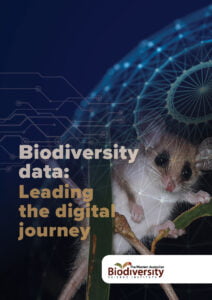Program: Biodiversity Data and Information Management
Projects
- Shared Environmental Analytics Facility (SEAF)
- Shared Analytic Framework for the Environment (SAFE 2.0) – Capabilities for a national supply chain of environmental information
- Index of Biodiversity Surveys for Assessments (IBSA)
- Digitally Transforming Environmental Impact Assessment
Leading the digital journey
Since 2016, The Western Australian Biodiversity Science Institute (WABSI) has led a strong collaboration of senior stakeholders from industry, government, regulators and the science community, to build a data sharing and access culture.
The collective efforts, led by WABSI, are enabling a better understanding of the cumulative environmental impacts of an action, on a region over time. They are also enhancing the access, aggregation, interpretation and management of biodiversity information collected in Western Australia.
The challenge
Helping to inform policy, planning and regulatory decisions
Biodiversity is a natural capital asset with immense economic and cultural significance for Western Australia. The need to balance economic activities that provide societal wealth, with community expectations and an increasing public focus on environmental sustainability, presents an opportunity to lift understanding and confidence in the ability to forecast the future state of our environment and the biodiversity within it.
Each year, a substantial amount of information on Western Australia’s biodiversity is collected by industry and government. The Western Australian Environmental Protection Agency EPA) recognises the importance of biodiversity information and accurate data in assessing environmental change, and its importance to effective decision-making processes at all levels.
The EPA also recognises that the key ongoing challenges are to:
- Improve the efficiency for environmental assessments from project inception to final decision, for both the proponent and regulator.
- Improve the confidence of the regulator that they have made an informed decision at both the project level and at a landscape (cumulative impact) scale.
- Improve public trust in Environmental Impact Assessment decisions through transparency and visibility of data and methods underpinning decisions.
- Provide assurance that compliance with Ministerial conditions are proceeding as planned through continuous monitoring, assessment and reporting.
The knowledge gaps and priorities for creating an information asset for Western Australia

- Create and lead a culture of shared expertise, common data standards, policies and incentives for data sharing and support a system for persistent storage and archiving of data.
- Mobilise biodiversity data from all available sources (Environmental Impact Assessment, government agencies, Natural Resource Management groups, the research community, community groups etc.) to make the data promptly and routinely available to the entire biodiversity community.
- Curate and manage surveys into data layers that give individual surveys context and meaning, enabling this data to be used as evidence.
- Deliver (or enable) informed, trusted analytical and assurance outcomes using shared solutions and technologies.
- Support optimised policy and decision making, transparent, efficient assessment and assurance processes as well as informed environmental adaptive management frameworks to provide investment confidence and an informed community.
Want to engage with us?
Email us data@wabsi.org.au
